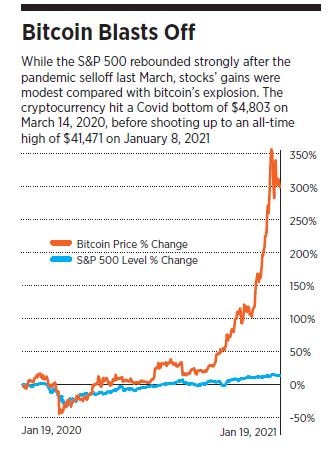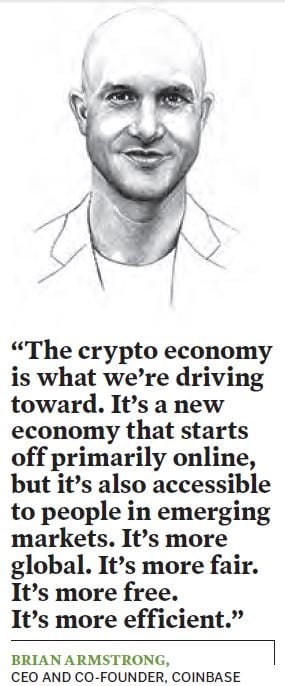
Corporate cryptomania: Bitcoin catches the C-suite gaze
Up 300 percent in 2020, bitcoin is suddenly getting respect in the C-suite. Here's how PayPal, Square and the 48 other big companies on Forbes's third annual Blockchain 50 are outpacing their competition using bitcoin and the underlying blockchain
 Covid Currency: After the pandemic hit, PayPal CEO Dan Schulman (left) seized on digital cash to speed ecommerce transactions. MicroStrategy CEO Michael Saylor filled his company’s treasury with bitcoin as a bet against devaluation of the dollar. The move
Covid Currency: After the pandemic hit, PayPal CEO Dan Schulman (left) seized on digital cash to speed ecommerce transactions. MicroStrategy CEO Michael Saylor filled his company’s treasury with bitcoin as a bet against devaluation of the dollar. The move
made him a billionaire
Locked down in his Palo Alto, California, home last March, as the coronavirus spread across the US, PayPal chief executive Dan Schulman knew that the pandemic was a once-in-a-lifetime business opportunity.
The pioneering electronic-payments company he took over in 2014 had been working toward a world without cash for two decades, but recently its growth had begun to slow. Over the decade after eBay acquired the startup in 2002, PayPal’s revenue grew at an average annual rate of 38 percent, but today, the company, again independent, is growing at half that rate. Now, as people retreated to their homes, online commerce and digital payments had suddenly become necessities in everyday life—for grocery shopping, banking and more.
Almost immediately, PayPal’s active accounts began increasing—by more than 50 million, to 361 million, by the end of 2020. Its stock took off along with other digital-economy shares, from $86 last March to a recent $247. In April, some $269 billion in stimulus payments needed to be distributed, and PayPal stepped in to help get cash to the seven million American households without bank accounts. As PayPal worked to accommodate the unbanked, Schulman felt a sense of urgency.
“You were seeing the acceleration of trends that would have typically taken maybe three to five years happening in three to five months,” says Schulman, 63. “I thought it was important that PayPal help shape what that future could look like and not react to it.”
(This story appears in the 30 November, -0001 issue of Forbes India. To visit our Archives, click here.)



 Under Schulman’s direction, PayPal immediately started hiring employees with expertise in bitcoin and blockchain. In October, Schulman announced that it would let customers buy, hold and sell cryptocurrency directly via their PayPal accounts. Cryptocurrency now can be used as payment at any of PayPal’s 26 million affiliated merchants worldwide. Not that most people would want to spend it: Since the onset of the pandemic, the price of bitcoin has increased from $4,803 to more than $36,000 as of mid-January.
Under Schulman’s direction, PayPal immediately started hiring employees with expertise in bitcoin and blockchain. In October, Schulman announced that it would let customers buy, hold and sell cryptocurrency directly via their PayPal accounts. Cryptocurrency now can be used as payment at any of PayPal’s 26 million affiliated merchants worldwide. Not that most people would want to spend it: Since the onset of the pandemic, the price of bitcoin has increased from $4,803 to more than $36,000 as of mid-January.  Fuelled by small-fry speculators, demand for PayPal’s easy-to-buy crypto services has been so great that there is both a wait list and purchase limits, currently $20,000 a week. It’s a similar story at Square. Pantera Capital, a Menlo Park, California–based blockchain investment firm, estimates that PayPal and Square are buying up most of the 900 new bitcoins being mined each day. This year, Schulman says, PayPal will expand its cryptocurrency service to Venmo’s 40 million customers. “It’s not just an investment instrument,” he adds. “It’s a way that we will enable commerce.”
Fuelled by small-fry speculators, demand for PayPal’s easy-to-buy crypto services has been so great that there is both a wait list and purchase limits, currently $20,000 a week. It’s a similar story at Square. Pantera Capital, a Menlo Park, California–based blockchain investment firm, estimates that PayPal and Square are buying up most of the 900 new bitcoins being mined each day. This year, Schulman says, PayPal will expand its cryptocurrency service to Venmo’s 40 million customers. “It’s not just an investment instrument,” he adds. “It’s a way that we will enable commerce.” 



